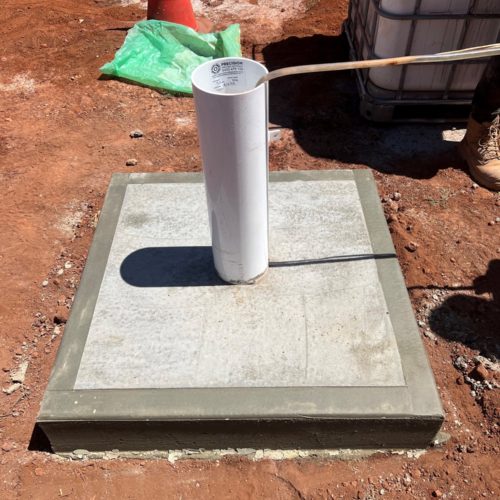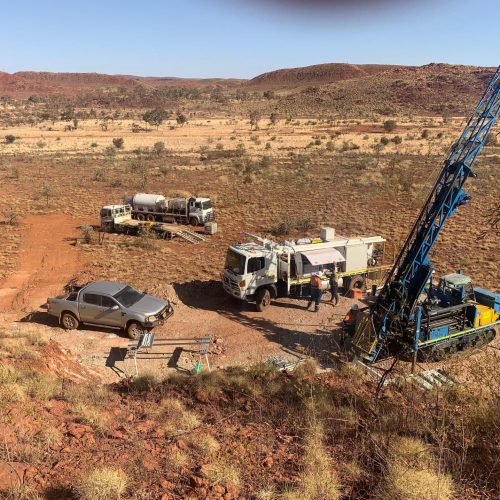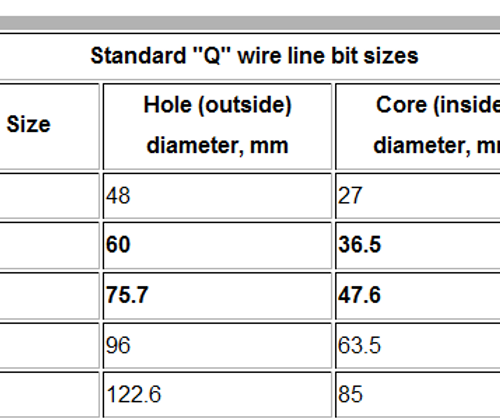When you’re tackling a complex drilling project in Western Australia’s mining sector, choosing the right drilling contractor can make or break your operation. The drilling industry has come a long way from the basic hammer-and-chisel days, and today’s sophisticated drilling methods can tackle everything from shallow soil investigations to deep mineral exploration with remarkable precision.
At Precision Drilling, we’ve been serving Perth and the broader WA mining community with a comprehensive range of drilling services that combine cutting-edge technology with decades of hands-on experience. Whether you need environmental monitoring wells or complex geotechnical investigations, understanding the different types of drilling available helps you make informed decisions that contribute to your project’s success.
Understanding Modern Drilling Technology
Let’s be honest, drilling might look straightforward from the outside, but it’s actually a sophisticated blend of engineering, geology, and practical problem-solving. The drilling process involves much more than simply pushing a drill bit into the ground. Different soil types, rock formations, and project objectives all demand specific approaches and equipment.
The most common drilling methods each serve distinct purposes, and choosing the right technique can significantly impact your project’s timeline, budget, and results. From rotary drilling, which uses fluid circulation to carry rock fragments to the surface, to diamond drilling, which produces pristine core samples for analysis, each drilling method has its own sweet spot.
Core Drilling Methods for WA Conditions
Mud Rotary Drilling
Mud rotary drilling remains one of our most versatile and widely used drilling types. This method employs a rotating bit that cuts through formations while drilling mud circulates down the drill pipe and back up the annulus, carrying rock fragments to the surface. The drilling mud also stabilises the borehole walls and cools the drill bit, crucial factors when you’re dealing with WA’s challenging geological conditions.
We’ve found this drilling method particularly effective for water bore drilling and larger diameter holes where soil conditions are variable. The continuous circulation keeps the hole clean and provides excellent geological information through the cuttings analysis. It’s also cost-effective for reaching moderate to significant depths while maintaining good hole stability.
Reverse Circulation Drilling
Our reverse circulation drilling service has become incredibly popular in the mining sector, and for good reason. This technique uses compressed air to force sample material up through the inner tube of a dual-wall drill pipe system. The result? Cleaner, less contaminated samples that give you more accurate geological data.
RC drilling excels in exploration drilling where sample quality is paramount. This common drilling method provides continuous sampling with minimal cross-contamination between different geological layers. We’ve used this technique successfully for everything from mineral exploration to groundwater monitoring wells, and it’s particularly effective in loose soil and unconsolidated formations.
Diamond Drilling
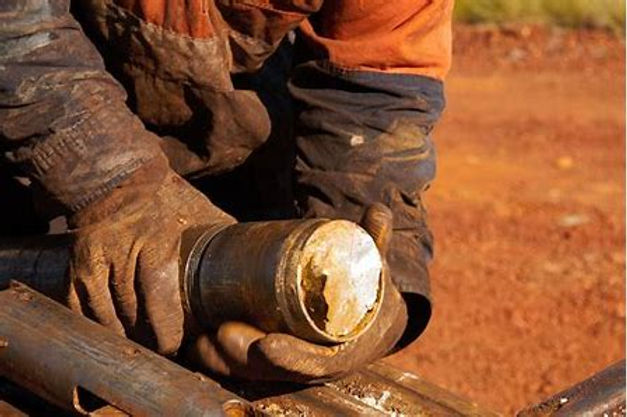
When you absolutely need intact core samples for detailed analysis, diamond core drilling is your go-to solution. Using industrial diamonds embedded in the drill bit, this method cuts a continuous cylinder of rock that preserves the geological structure and characteristics. It’s like getting a geological cross-section that tells the complete story of what’s below ground.
We regularly employ diamond drilling for geotechnical drilling, mineral exploration, and situations where core samples are essential for engineering analysis. While it’s more expensive per meter than other drilling types, the quality of information it provides often makes it the most cost-effective choice for critical decision-making.
Air Core Drilling
Air core drilling uses compressed air to remove cuttings from the hole, making it an excellent choice for rapid exploration drilling in suitable formations. This drilling method works particularly well in areas where you need to cover significant ground quickly while still obtaining representative samples.
The technique excels in early-stage exploration work and environmental drilling, where establishing the general geological picture is crucial before committing to more detailed and expensive investigation drilling methods.
Sonic Drilling
Our sonic drilling capability represents some of the most advanced drilling technology available. This method uses high-frequency vibrations to advance the drill string through various formations, including materials that might challenge conventional drilling methods.
Sonic drilling excels in environmental applications and contaminated site investigations because it provides excellent sample recovery with minimal disturbance to the surrounding formation. We’ve found it particularly valuable for tailings dam drilling and situations where maintaining the natural structure of the material is crucial.
Specialised Testing and Instrumentation Services
Beyond basic drilling, modern projects often require sophisticated testing and monitoring capabilities. That’s where our instrumentation and testing services come into play.
Pneumatic Testing and Monitoring Solutions
Our pneumatic testing services help evaluate subsurface conditions and system performance. This includes installation and testing of monitoring equipment that provides ongoing data about groundwater levels, soil conditions, and structural performance.
We regularly install vibrating wire piezometer systems for long-term monitoring of water pressures and ground movement. These instruments are essential for tailings dam monitoring, slope stability assessments, and dewatering operations.
Permeability and Groundwater Services
Understanding how water moves through subsurface formations is crucial for many mining and construction projects. Our packer permeability testing services provide detailed information about formation permeability at specific depths, helping engineers design effective dewatering and water management systems.
We also specialise in groundwater monitoring well installation, creating long-term monitoring networks that provide essential data for environmental compliance and operational decision-making.
Specialised Applications for Mining and Industry
Environmental and Tailings Dam Projects
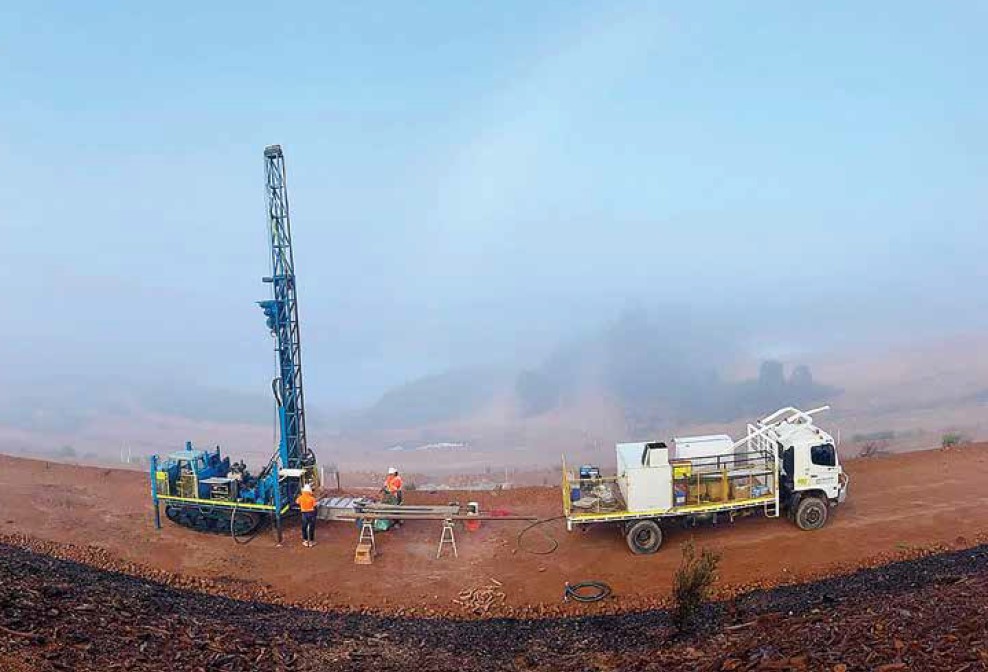
Environmental drilling requires special consideration for contamination control and sample integrity. Our environmental drilling services include specialised procedures to prevent cross-contamination and ensure that samples accurately represent site conditions.
For tailings dam projects, we provide comprehensive drilling services that support both construction and ongoing monitoring requirements. This includes the installation of monitoring instruments, assessment of foundation conditions, and ongoing stability monitoring using appropriate drilling methods tailored to each specific requirement.
Hydro Drilling Projects
Water is life in Western Australia’s mining operations, and our hydro drilling services help ensure reliable water supplies. From production water bores to dewatering systems, we understand the unique challenges of water management in mining environments.
Our water bores drilling services include everything from exploration and installation to testing and development.
Geotechnical and Foundation Support
Geotechnical drilling provides the foundation data that engineers need for safe, cost-effective design decisions. Our geotechnical drilling services include everything from preliminary site investigations to detailed foundation studies across different soil types and rock formations.
We regularly perform test pitting services that provide direct visual inspection of soil and rock conditions. Sometimes there’s no substitute for actually seeing the ground conditions firsthand, and test pits provide that clarity for shallow holes and surface investigations.
Advanced Ground Treatment Services
Sometimes drilling is just the first step in ground treatment and stabilisation. Our grouting services offer solutions for a range of applications, including water control and ground stabilisation.
Grout Packing and Pressure Grouting
Our grout packing services help seal formations and control water flow. Whether you’re dealing with unwanted water ingress or need to stabilise loose soil formations, grouting provides an effective solution that complements our drilling methods.
High-pressure grouting allows us to inject treatment materials into tight formations or create strong, impermeable barriers. This technique is particularly valuable for dam construction and remediation projects, often following specialised drilling to create the necessary access points.
Specialised Installation Services
We also provide specialised installation services, including earthing and anode drilling for electrical systems, as well as dump leach cyanide injection well installation for mining operations. These specialised services require both drilling expertise and understanding of the specific operational requirements.
Curtain grouting creates underground barriers for water control, while our dewatering services help manage groundwater during construction and mining operations. Each application requires careful selection of drilling tools and methods to achieve the desired results.
Choosing the Right Approach for Your Project
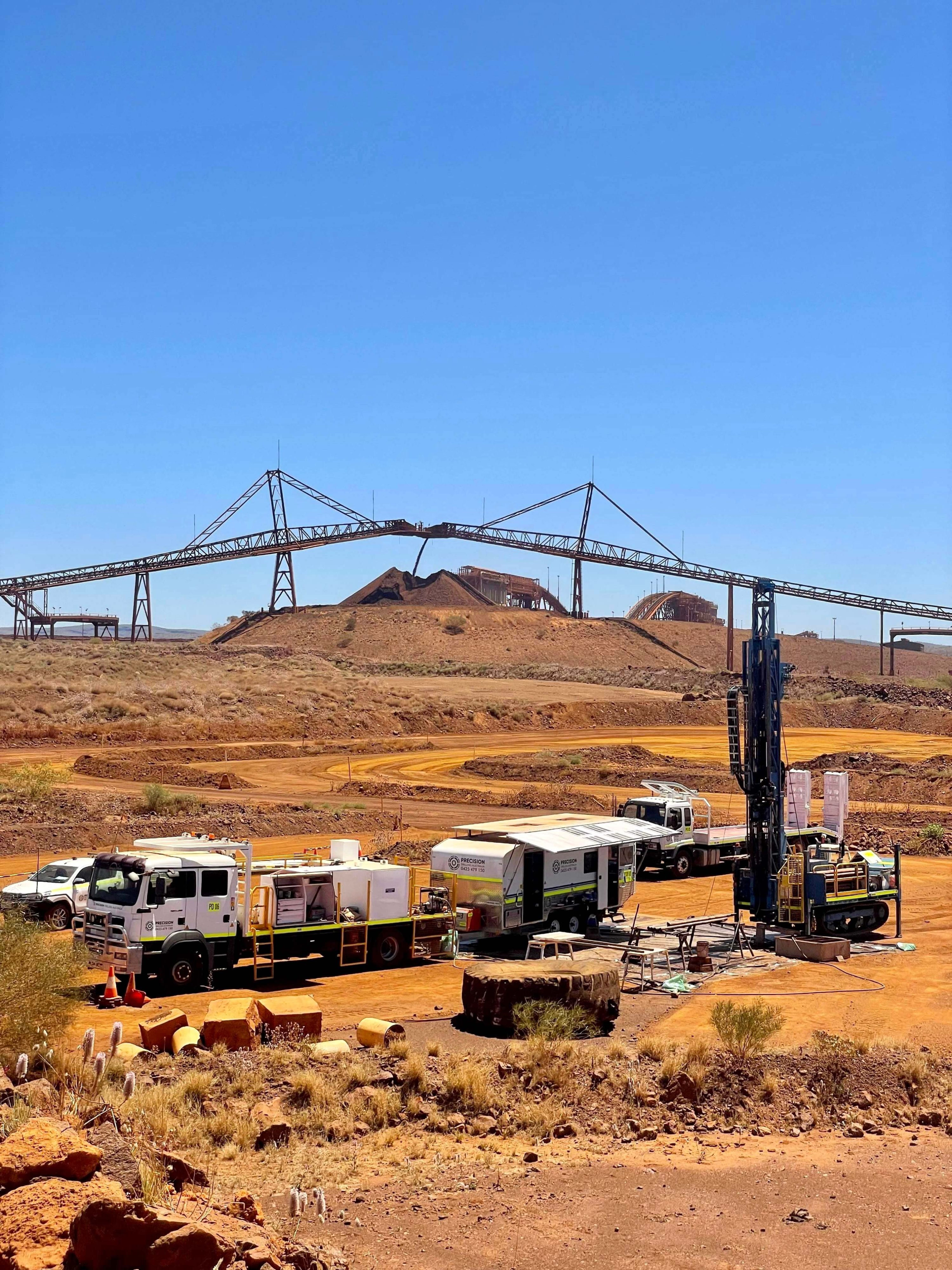
Selecting the appropriate drilling method isn’t just about the technical capabilities; it’s about understanding your project’s specific requirements and constraints. The soil type obviously plays a major role, but so do factors like access limitations, environmental sensitivity, and budget considerations.
For shallow investigations in loose soil, direct push technology or air core might be the most cost-effective approach. When you need detailed geological information from consolidated formations, diamond drilling provides unmatched sample quality. For large diameter holes or water wells, mud rotary drilling offers the best combination of efficiency and effectiveness.
The key is matching the drilling method to your project’s specific needs, while considering factors such as required drilling depths, sample quality requirements, and site access limitations. Different types of drilling excel in different conditions, and our experience helps identify the optimal approach.
Equipment and Technology That Makes the Difference
Modern drill rigs come in various configurations to meet different project requirements. From truck-mounted units that offer mobility and quick setup times to larger rigs that provide the power necessary for deep drilling applications, the choice of drill rig depends on access requirements, drilling depth, and the specific method being employed.
The drill bit represents the cutting edge of any drilling operation. Different bit types serve specific purposes across the various drilling types we employ. Understanding bit selection criteria ensures optimal drilling performance and cost-effective operations, whether we’re using tri-cone roller bits for soft formations or specialised hammer bits for hard rock applications.
Drill pipe and drill string components transmit both rotational force and downward pressure to the cutting surface. Modern drilling tools incorporate advanced materials and designs that extend service life and improve performance across all the common drilling methods we use.
Local Expertise Makes the Difference
Operating in Western Australia’s diverse geological conditions has taught us that local knowledge matters. From the variable soil conditions of the Perth metropolitan area to the remote mining sites in the Pilbara, each location presents unique challenges that require adapted approaches.
Our team understands WA’s geological formations, regulatory requirements, and operational challenges. This local expertise enables us to recommend the most suitable drilling types and anticipate potential complications before they impact your project schedule or budget.
Whether you’re dealing with hard rock formations that require percussion drilling techniques or soft formations that excel with rotary methods, we have the experience to select the right approach. Our understanding of local ground conditions helps optimise drilling methods for maximum efficiency.
Technology and Innovation in Modern Drilling
The drilling industry continues to evolve, with new technologies and methods constantly improving our ability to gather subsurface information efficiently and accurately. At Precision Drilling, we stay current with these developments while maintaining focus on the proven drilling types that deliver reliable results.
Advanced drilling tools now allow us to reach greater depths with improved sample quality. Compressed air systems have become more efficient, fluid circulation systems more effective, and drill bits more durable. These improvements mean better results for our clients across all types of drilling projects.
From underground mining applications that require precise core samples to construction projects needing reliable foundation data, the evolution of drilling methods continues to expand what’s possible in subsurface investigation and construction support.
Whether you’re planning a major mining project, need environmental compliance monitoring, or require specialised geotechnical investigation, understanding these different drilling types and their applications helps ensure project success. The right drilling method, properly executed by experienced professionals, provides the foundation for informed decision-making and successful project outcomes.
From our base in Perth, we’re ready to bring decades of WA drilling experience to your next project, combining the right technology with local expertise to deliver the results you need across all types of drilling applications.

